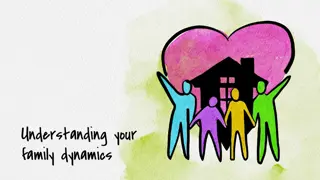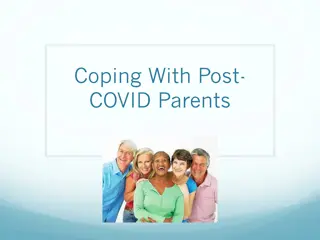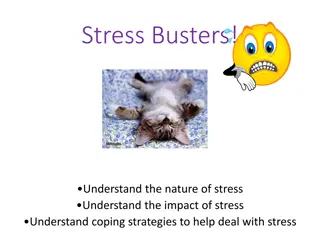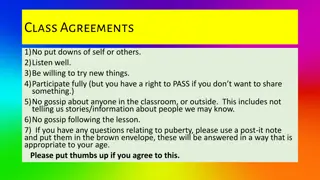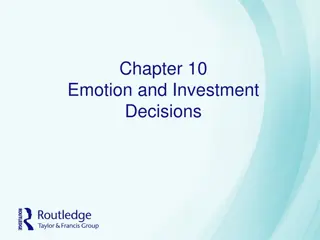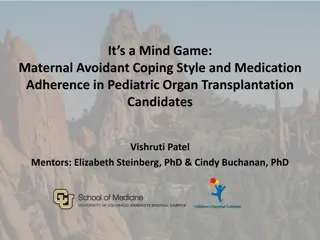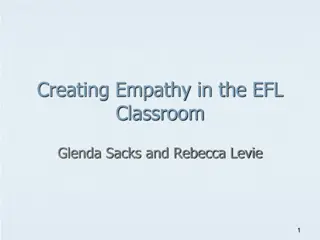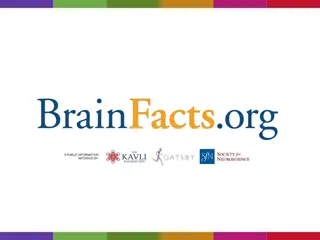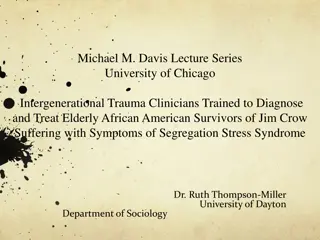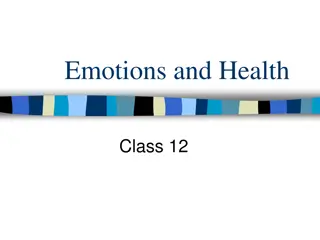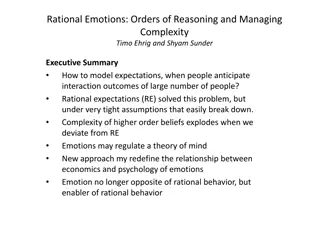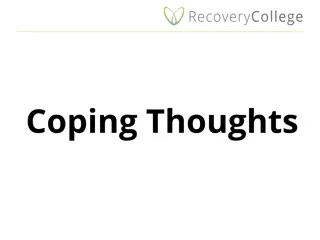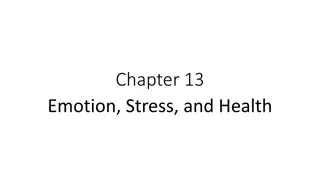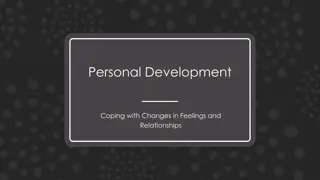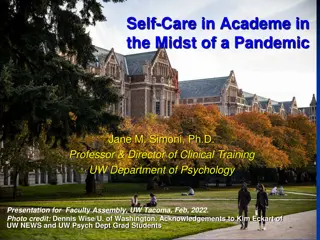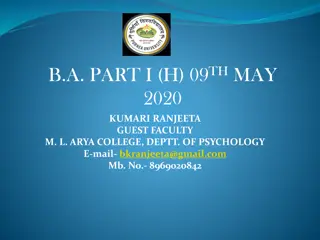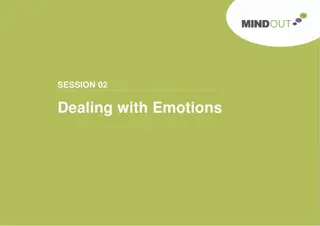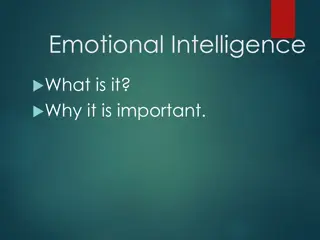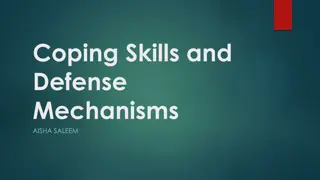
Life Skills Education: Empowering Learners through Interdisciplinary Approach
Explore the evolution and impact of Life Skills Education introduced by CBSE, emphasizing self-awareness and positive behavior in students. Discover the importance of teacher training and UNESCO's Education For All goals in shaping modern education practices.
Download Presentation

Please find below an Image/Link to download the presentation.
The content on the website is provided AS IS for your information and personal use only. It may not be sold, licensed, or shared on other websites without obtaining consent from the author. If you encounter any issues during the download, it is possible that the publisher has removed the file from their server.
You are allowed to download the files provided on this website for personal or commercial use, subject to the condition that they are used lawfully. All files are the property of their respective owners.
The content on the website is provided AS IS for your information and personal use only. It may not be sold, licensed, or shared on other websites without obtaining consent from the author.
E N D
Presentation Transcript
BACKGROUND Life Skills Education - Introduced for class VI in 2003-2004. - Interdisciplinary in nature. - Evaluation through Comprehensive Evaluation only positive attributes of learners to be reflected. - Develops self awareness, sensitivity and positive adaptive behaviour in children. - Implemented in class VII in 2004-2005 and in class VIII in 2005-06. - Course materials have been published by CBSE. - Training Programmes are being conducted. Circulars Nos.21/05.09.03, 11/26.02.04; 04/25.01.05 grades as Continuous and social commitment, eco-
An Excerpt- Empowerment of Teachers New syllabus, new courses, new approach in pedagogy Extensive and continued teachers is required CBSE extends help for such teachers training courses Besides this step, the Board provides training to teachers Management, Education in Life Skills and Mathematics Laboratory. It is necessary for the schools also to provide the teachers understanding of NCF 2005 and the new NCERT syllabus training of in Disaster a thorough www.schoolofeducators.com
UNESCOS Education For All Goals and Life skills EFA-Education for All Goals Six internationally agreed education goals aim to meet the learning needs of all children, youth and adults by 2015.
Life Skills in EFA EFA Goal No.3 : Ensure that the learning needs of all young people and adults are met through equitable access to appropriate learning and life-skills programmes EFA Goal No. 6 : Improving all aspects of the quality of education, and ensuring excellence of all so that recognized and measurable learning outcomes are achieved by all, especially in literacy, numeracy and essential life skills
WHY LEARNING LIFE SKILLS ? Delors Report : Learning: The Treasure Within Learning To Know Learning To Be Learning To Do Learning To Live Together
SHIFTING LIFE SKILL CONCEPT From: skills Survival and income generation (i.E. Livelihood skills) To: function and participate in daily life (i.e. Life skills) Individual's capacity to fully
ACTIVITY 1 MAKE A BID. YOU ARE GIVEN A 1000 POINTS LOOK AT THIS LIST AND ALLOT POINTS AS PER YOUR PRIORITY
ACTIVITY 2 POSITIVE STROKES Positive Strokes make one feel good about oneself It also makes you feel good when you say nice things to each other Feeling good makes you behave in a more positive manner in everyday situations
KEY ISSUES AND CONCERNS OF ADOLESCENTS 1.Developing an Identity ?Self awareness helps adolescents understand themselves and establish their personal identity. Lack of information and skills prevent them from effectively exploring their potential and establishing a positive image and sound career perspective.
KEY ISSUES AND CONCERNS OF ADOLESCENTS 2.Managing Emotions Adolescents have frequent mood changes reflecting feelings of anger, sadness, happiness, fear, shame, guilt, and love. Very often, they are unable to understand the emotional turmoil. They do not have a supportive environment in order to share their concerns with others. Counseling facilities are not available.
KEY ISSUES AND CONCERNS OF ADOLESCENTS 3.Building Relationships As a part of growing up, adolescents redefine their relationships with parents, peers and members of the opposite sex. Adults have high expectations from them and do not understand their feelings. Adolescents need social skills for building positive and healthy relationships with others including peer of opposite sex. They need to understand the importance of mutual respect and socially defined boundaries of every relationship.
KEY ISSUES AND CONCERNS OF ADOLESCENTS 4. Resisting Peer Pressure Adolescents find it difficult to resist peer pressure. Some of them may yield to these pressures and engage in experimentation. Aggressive self conduct; irresponsible behaviour and substance abuse involve greater risks with regard to physical and mental health. The experiment with smoking and milder drugs can lead to switching over to hard drugs and addiction at a later stage.
KEY ISSUES AND CONCERNS OF ADOLESCENTS 5.Acquiring Information, Education and Services on issues of Adolescence Exposure to media and mixed messages from the fast changing world have left adolescents with many unanswered questions The widening gap in communication between adolescents and parents is a matter of great concern. Teachers still feel inhibited to discuss issues frankly and sensitively. Adolescents seek information from their peer group who are also ill informed and some may fall prey to quacks. Fear and hesitation prevents them from seeking knowledge on preventive methods and medical help if suffering from RTIs and STIs.
KEY ISSUES AND CONCERNS OF ADOLESCENTS 6.Communicating and Negotiating safer life situations Sexually active adolescents face greater health risks. Girls may also face mental and emotional problems related to early sexual initiation. Resisting the vulnerability to drug abuse, violence and conflict with law or society.
UNDERSTANDING LIFESKILLS- A Teacher s Perspective Life skills have been defined as the abilities for adaptive and positive behaviour that enable individuals to deal effectively with the demands and challenges of everyday life (WHO). Adaptive means that a person is flexible in approach and is able to adjust in different circumstances. Positive behaviour implies that a person is forward looking and even in difficult situations, can find a ray of hope and opportunities to find solutions.
Life skills include psychosocial competencies and interpersonal skills that help people make informed decisions, solve problems, think critically and creatively, communicate effectively, build healthy relationships, empathize with others, and cope with managing their lives in a healthy and productive manner
UNICEF life-skills based education is -behavior change or behavior development approach -designed to address a balance of three areas: knowledge, attitude, and skills.
KEY LIFESKILLS The Ten core Life Skills as laid down by WHO are: 1.Self-awareness 2. Empathy 3. Critical thinking 4. Creative thinking 5. Decision making 6. Problem Solving 7. Effective communication 8. Interpersonal relationship 9. Coping with stress 10. Coping with emotion
GENERIC LIFE SKILLS 1 COGNITIVE SKILLS including search, selection, analysis of information; critical thinking; problem-solving; understanding consequences; decision-making; adaptability; creativity 2 EMOTIONAL COPING SKILLS including motivation; sense of responsibility; commitment; managing stress; managing feelings; self- management, self-monitoring and self- adjustment 3 SOCIAL OR INTERPERSONAL SKILLS including communication; assertiveness; negotiation/refusal skills; cooperation; empathy; teamwork
Important FAQs LET S DISCUSS SOME KEY QUESTIONS
KEY STEPS IN LIFESKILLS APPLICATION FROM KNOWLEDGE TO SKILL TO APPLICATION AND ADVANCING ATTITUDE
Scholastic LIFE SKILLS IN THE CURRICULUM Academic Work ation Art Education Co Scholastic Life Skills Attitudes and Values Participation and Achievement Outdoor Activities experience Physical and Health Education
Comprehensive Scholastic - Subject specific areas. Co-Scholastic - Life skills, attitudes & values and other co curricular activities Includes a variety of tools and techniques for assessment of the learners.
GRADING SCALE FOR SCHOOL ASSESSMENT Assessment areas: GRADING SCALE (Point) Part 1 A : Scholastic Part 1 B : Scholastic 9 5 Part 2 : Co-Scholastic Part 2 A : Life Skills Part 2 B : Attitudes & Values Part 3 : Co-Scholastic Part 3 A: Co-curricular Activities Part 3 B :Health & Physical Education 5 3 3 3
GRADES Work Experience Art Education Physical Education Life skills GRADE A+ A B+ B C
THINKING SKILLS Student demonstrates the ability to: INDICATORS : Be original, flexible and imaginative. Most indicators in a skill A+ Many indicators in a skill A Raise question, identify and analyze problems. Some indicators in a skill B+ Implement a well thought out decision Few indicators in a skill B Very few indicators in a skill C and take responsibility. Generate new ideas with fluency. Elaborate / build on new ideas.
SOCIAL INDICATORS : Student demonstrates the ability to: Identify, verbalize and respond effectively to other s emotions in an empathetic manner. Most indicators in a skill A+ Get along well with others . Many indicators in a skill A Some indicators in a skill B+ Take criticism positively. Few indicators in a skill B Very few indicators in a skill C Listen actively. Communicate using appropriate words, intonation and body language.
EMOTIONAL INDICATORS : Student demonstrates the ability to: Identify own strength and weakness. Be comfortable with self and overcome weakness for positive self concept. Identify causes and effects of stress on oneself. Develop and use multi-faceted strategies to deal with stress. Express and respond to emotions with an awareness of the consequences.
What are the Life Skills ? Interpersonal Relationship Self Awareness Empathy Effective Communication Decision Making Creative Thinking Critical Thinking Problem Solving Negotiation Skills Coping with stress & Emotions
Significance of learning Life Skills To be able to explore alternatives Weigh pros and cons Make rational decisions Communicate effectively To say No Be assertive
What is Decision Making ? Abilities to assess available options To foresee the consequences of different decisions (actions/non- actions) No decision is also a decision
Decision Making Major Life Decisions GOALS Develop, Prioritize, attain CHOICE Of life style, study & food habits, hobbies COPING UP With stress, alcohol, drugs, STD, AIDS CAREER Choice of profession, further study
Responsible Decision Making Making decision after examining the choices & consequences in view of one s values and goals is Responsible Decision Making
Steps for Responsible Decision Making Identify/Define the problem Consider the consequences or outcomes Consider family and personal values Choose one alternative Implement the decision
Creative Thinking Enables to explore available alternatives and consequences of actions or non-actions Contributes to Decision Making & Problem Solving Helps adolescents to respond adaptively and with flexibility to the daily life situations
Critical Thinking Ability to analyze information and experiences in an objective manner Helps adolescents to recognize and to assess the factors influencing attitude & behavior - values, pressures (peer , family) Key to form right attitudes towards life Assists in developing responsible behavior.
Effective Communication To express ourselves verbally & non-verbally To express opinions, desires, needs & fears also To ask for advice and help
Empathy Ability to understand and accept others To put oneself in other person s shoes Being nurturing and tolerant Encourages a positive behavior towards people in need or difficulty
Interpersonal Skills To be able to develop & nurture supportive networks To be able to end relationships constructively Helps adolescents to relate with people in positive ways
NEGOTIATING SKILLS Allows to solve an issue, problem or conflict Without anger, intimidation, insubordination, aggressive force or behavior Negotiate as soon as possible for communication Deals constructively with problems PROBLEMS if left unresolved PHYSICAL STRESS MENTAL &
1. Ignorance 2. Awareness 3. Concern 4. Knowledge 5. Motivation 6. Readiness to change 7. Willingness to change 8. Acceptance 9. Habit 10.Lifestyle Behavior change through Life Skills
STAGES Identify the problem or issue Collect information/knowledge Associated physical, emotional, psychological feelings Possible ways of solving Effective communication skills Alternative solutions Mutual decision
Coping with emotions & stress Recognizing effects of emotions on others and ourselves Being aware of how emotions influence behaviors Able to respond to emotions appropriately
How to cope with stress Recognize sources of stress in our life Recognizing how these affect us Identifying ways that help to control our levels of stress Learning how to relax to minimize tensions
Self Assertiveness Assertive people respect themselves & others equally It is communicating feelings and need while respecting rights of others Being able to stand up for one s own values and needs Take control of one s decisions Recognize attempts of others to control
Life Skills Education Dynamic teaching & Dynamic learning Working in small groups & pairs Brainstorming Role-plays Experiential learning Games & debates Home assignments, to further discuss and practice skills with family & friends.

